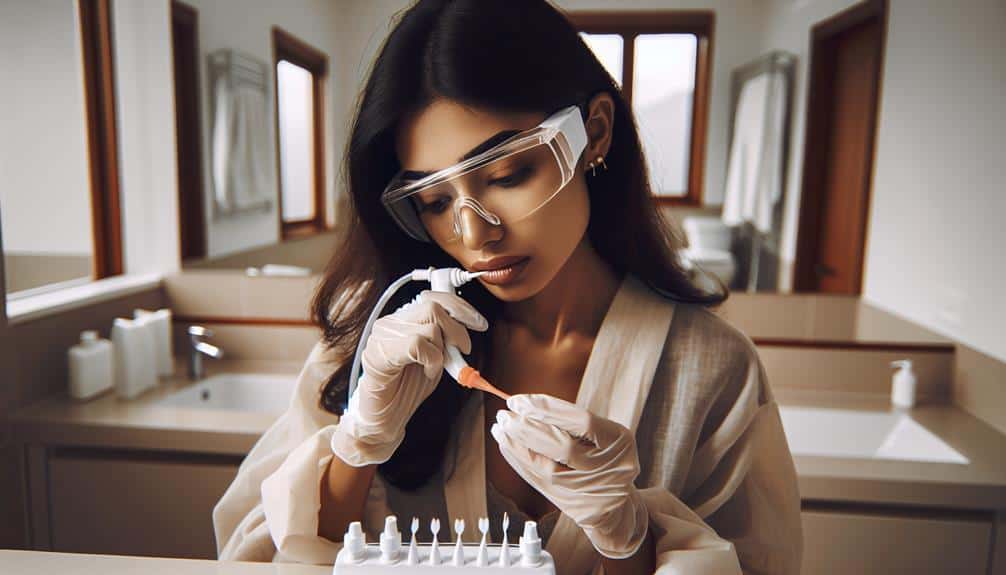When whitening your teeth, it's important to be aware of potential cancer risks that may be associated. Whitening products contain chemicals like hydrogen peroxide and carbamide peroxide which, if not used correctly, can lead to sensitivity and gum irritation. While there is no direct link between teeth whitening and cancer, individual responses can vary due to genetic factors and the environment. For a thorough understanding of safe whitening practices, consulting a dental professional is essential. Remember, your oral health is a priority, and being well-informed is key to making the best decisions for your bright smile.
Key Points
- No direct link between teeth whitening and cancer has been established.
- Whitening product chemicals are considered safe for oral use.
- Individual responses to whitening treatments may vary.
- Genetic predisposition and environmental factors can influence reactions.
- Consulting a dental professional is essential for safe whitening practices.
Harmful Chemicals in Whitening Products
When whitening your teeth, it's important to be aware of the potentially harmful chemicals present in whitening products. These products often contain chemicals such as hydrogen peroxide, carbamide peroxide, and other bleaching agents that work to remove stains from your teeth. The chemical composition of these whitening agents can have health consequences if not used properly.
Hydrogen peroxide, for instance, is a common ingredient in many teeth whitening products. While it's effective at breaking down stains and discoloration on the teeth, it can also cause sensitivity and irritation to the gums if used in high concentrations or for extended periods. Carbamide peroxide, another commonly used bleaching agent, can also lead to gum irritation and tooth sensitivity if not applied according to the product instructions.
It is crucial to adhere to the guidelines provided by the manufacturer when using teeth whitening products to minimize the risk of adverse health effects. Always consult with your dentist before starting any whitening treatment to guarantee it's safe for your teeth and gums.
Potential Impact on Oral Tissues
Proper use of teeth whitening products is essential to prevent potential adverse effects on your oral tissues. When using these products, it's important to prioritize your oral health by considering enamel protection. Teeth whitening procedures, whether done at home or professionally, can sometimes lead to temporary tooth sensitivity or irritation of the gums. These effects are usually mild and subside after treatment. However, improper or excessive use of whitening products can damage the enamel, the protective outer layer of your teeth. Enamel protects your teeth from decay and sensitivity, so safeguarding it's paramount for maintaining good oral health.
To minimize the risk of adverse effects on your oral tissues, it's advisable to follow the instructions provided with the whitening products carefully. If you experience prolonged sensitivity or irritation, consult your dentist promptly. Additionally, consider professional dental consultations before starting any whitening treatment, especially if you have underlying oral health issues. Prioritizing enamel protection and overall oral health will help you achieve a brighter smile without compromising the health of your teeth and gums.
Link Between Whitening and Cancer
Teeth whitening procedures haven't been definitively linked to an increased risk of developing cancer. Research indicates that the chemicals commonly used in teeth whitening products, such as hydrogen peroxide or carbamide peroxide, are considered important for oral use in the concentrations typically found in these products. However, it's important to note that individual responses to whitening treatments may vary based on factors like genetic predisposition and environmental influences.
Genetic predisposition plays a role in how our bodies react to different substances, including those used in teeth whitening. Some individuals may have genetic variations that make them more sensitive to certain chemicals, potentially increasing the risk of adverse reactions. Additionally, environmental factors like tobacco use or exposure to certain toxins can also impact how our bodies respond to whitening agents.
While no direct link between teeth whitening and cancer has been established, it's essential to take into account individual differences and potential sensitivities when undergoing such treatments. Always consult with a dental professional to make sure the safest approach to teeth whitening based on your unique circumstances.
Safety Concerns for Long-Term Use
Long-term use of teeth whitening products may raise safety concerns due to potential cumulative effects on oral health. While achieving a bright smile is desirable, it's important to be mindful of the risks associated with prolonged use of whitening treatments. Here are some key factors to keep in mind:
- Enamel Erosion: The repeated use of teeth whitening products can lead to enamel erosion over time. Enamel is the protective outer layer of the teeth, and its deterioration can result in increased tooth sensitivity and other dental problems.
- Gum Sensitivity: Whitening products may also cause gum sensitivity, especially if the bleaching agents come into contact with the gums. This can lead to discomfort, irritation, and even gum recession if not addressed promptly.
- Tooth Damage: Continuous use of whitening products without proper guidance can potentially damage the tooth structure, affecting not only the appearance but also the overall health of your teeth.
It is essential to strike a balance between achieving a brighter smile and maintaining good oral health to prevent long-term complications.
Advice for Safer Whitening Practices
For important whitening practices, consider consulting with a dental professional to assess your oral health needs and determine the most appropriate treatment plan. Professional supervision is vital in ensuring that teeth whitening procedures are safe and effective. Your dentist can evaluate your oral health status, identify any underlying issues that may affect the whitening process, and recommend suitable options tailored to your specific needs.
When seeking teeth whitening, natural alternatives can also be considered. Some natural remedies like baking soda, activated charcoal, or hydrogen peroxide solutions may help whiten teeth to a certain extent. However, it's essential to use these natural methods cautiously and consult with your dentist beforehand to prevent any potential harm to your teeth or gums.
In addition to professional supervision and natural alternatives, maintaining good oral hygiene practices is key to a brighter smile. Regular brushing, flossing, and dental check-ups can help prevent stains and discoloration, promoting overall oral health and enhancing the effects of whitening treatments. Remember, a healthy smile is a beautiful smile.
Frequently Asked Questions
Are There Any Natural Alternatives to Commercial Teeth Whitening Products That Are Safer for Long-Term Use?
Looking for natural alternatives to commercial teeth whiteners for safer long-term use? Consider natural remedies like baking soda or DIY methods with activated charcoal. These options can brighten your smile without potential risks.
Can Teeth Whitening Increase Sensitivity in the Teeth and Gums, and How Can This Be Managed?
To manage teeth and gum sensitivity, consider using toothpaste for sensitive teeth, avoiding acidic foods, and consulting your dentist. Long-term, natural remedies like oil pulling and a balanced diet can help prevent sensitivity issues.
Are There Any Specific Ingredients in Whitening Products That Are Known to Be More Harmful Than Others?
Like a skilled chef creating a delicate dish, understanding chemical compositions in whitening products is essential. Some ingredients pose higher risks than others. Awareness of ingredient safety and concerns is important to make informed choices.
How Often Should Teeth Whitening Be Done to Minimize Potential Cancer Risks?
To minimize potential cancer risks, it's important to balance the frequency of teeth whitening. Consult your dentist for personalized advice. Regular check-ups and following recommended guidelines can help mitigate any potential harm.
Are There Any Specific Groups of People Who Should Avoid Teeth Whitening Altogether Due to Increased Risks?
If you have medical conditions, allergies, are pregnant, or are an adolescent, it's wise to avoid teeth whitening due to heightened risks. Consult with your healthcare provider before undergoing any whitening treatments to guarantee safety.




